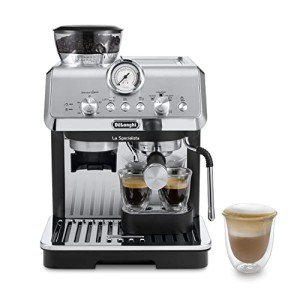Buzzwords, De-Buzzed: 10 Other Methods Of Saying Commercial Espresso Machines
The Rise of Home Espresso Machines: A Comprehensive Guide
As coffee enthusiasts continue to seek fresh and flavorful brews in the house, the appeal of home espresso machines has risen recently. No longer just the domain of coffee shops and coffeehouse, these machines empower individuals to craft barista-quality espresso beverages from the convenience of their kitchens. This post will explore the different types of home espresso machines, their functions, and factors to consider for picking the best one. Additionally, it will provide a selection of FAQs to assist prospective purchasers make informed decisions.
Types of Home Espresso Machines
Home espresso machines can be classified into a number of classifications based on their mechanisms and user-friendliness. Each type has its special functions, pros, and cons.
Type
Description
Pros
Cons
Manual Espresso Machines
Needs the user to manually control the developing process, involving methods like pulling a lever to develop pressure.
- Complete control over developing process
- Compact design
- Requires skill and practice
- Time-consuming
Semi-Automatic Machines
Machine automates water flow and pressure, however the user still controls the dosing and period of the developing procedure.
- Balance of automation and control
- Versatile
- Learning curve for perfecting strategies
Completely Automatic Machines
Automates the entire developing process, from grinding to developing, often with programmable settings for personalized drinks.
- Extremely user-friendly
- Quick and convenient
- Less control over the brewing process
- Higher cost point
Pill or Pod Machines
Utilizes pre-packaged espresso pills or pods to develop coffee quickly and easily.
- Extremely simple to use
- Minimal clean-up
- Limited flavor range
- More expensive per cup than ground coffee
Super-Automatic Machines
Integrates functions of completely automatic machines with built-in mills, enabling users to brew entire bean espresso and milk-based drinks with one touch.
- All-in-one convenience
- Ideal for milk-based drinks
- Often the most pricey
- Can be large
Functions to Consider
When picking a home espresso machine, possible buyers must consider the following features to guarantee they choose a machine that satisfies their requirements:
Grinder Type:
- Built-in grinders can offer fresher premises however may need more upkeep.
- Different mills allow for more personalization of grind size.
Pressure:
- Look for machines that produce at least nine bars of pressure, which is optimal for developing espresso.
Water Temperature Control:
- Machines with adjustable temperature settings permit better extraction of taste from beans.
Milk Frothing Options:
- Consider whether you want a manual steam wand for frothing or an automatic milk frother for convenience.
Ease of Cleaning:
- Machines with removable parts and self-cleaning functions substantially decrease clean-up time.
Size and Design:
- Ensure the machine fits conveniently in your kitchen and aligns with your aesthetic preferences.
Budget:
- Set a budget before starting your search, as rates can vary substantially from affordable designs to high-end machines.
Advantages of Home Espresso Machines
Owning a home espresso machine provides many benefits:
- Cost-Effective: Over time, brewing espresso at home can conserve coffee enthusiasts cash compared to regular coffee shop sees.
- Customization: Users can explore different beans, grind sizes, and developing techniques to discover their ideal cup.
- Convenience: The capability to brew espresso at any time eliminates the need to head out to a café, specifically beneficial during late nights or mornings.
- Quality assurance: With a home machine, people have complete control over the quality of active ingredients and developing procedures.
Disadvantages of Home Espresso Machines
Nevertheless, there are some downsides to think about:
- Initial Investment: High-quality espresso machines can be costly, needing a significant upfront financial investment.
- Knowing Curve: Mastering the art of espresso developing can take time and practice, which may be frightening for beginners.
- Maintenance: Like any device, espresso machines require regular cleaning and upkeep to guarantee optimum efficiency.
Frequently asked questions
1. What is the very best kind of home espresso machine for beginners?
Answer: For beginners, a semi-automatic machine is typically suggested as it uses a balance in between control and automation, allowing you to find out the basics without frustrating complexity.
2. Just how much should I invest in a home espresso machine?
Response: Entry-level machines can start around ₤ 100 to ₤ 300, while higher-end designs can range from ₤ 500 to over ₤ 2000. It's necessary to set a budget based upon your expected usage and wanted functions.
3. Do Modern Espresso Machines need a separate grinder?
Answer: While some espresso machines feature built-in mills, purchasing a different grinder permits higher modification and guarantees better quality premises.
4. How typically should sources tell me clean my espresso machine?
Answer: Cleaning frequency can vary by machine type, but it's normally advised to clean up the machine after each use and perform deep cleanings weekly or monthly, depending upon usage.
5. Can I make milk-based drinks with any espresso machine?
Answer: Not all machines feature milk frothing abilities. If you take pleasure in drinks like lattes or cappuccinos, try to find a machine with a steam wand or automatic frother.
Home espresso machines are transforming the method coffee enthusiasts enjoy their precious brews. With different types and advanced features readily available in the market, there is something for everyone. Whether it's the pleasure of creating distinct recipes or just relishing the best shot of espresso, investing in a home espresso machine can enhance both the coffee-drinking experience and the quality of life for coffee fans everywhere. Similar to any financial investment, it is vital to weigh the advantages versus the prospective disadvantages and pick a machine that perfectly fits both your lifestyle and preferences.
